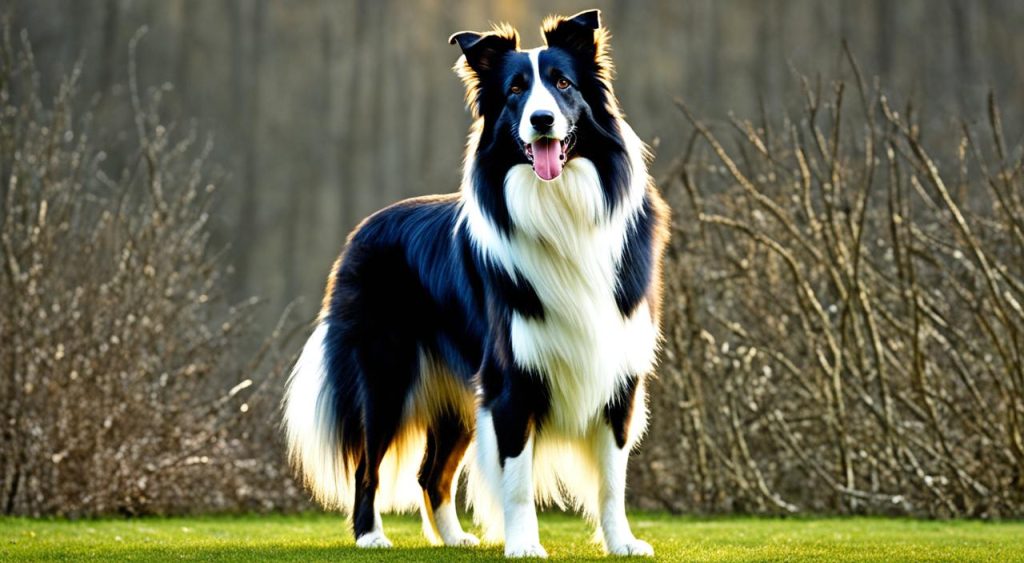Collies can be prone to certain health issues that pet parents should be aware of. While most of these issues can be managed with proper care and treatment, it is important to understand the potential risks. Here are some common health problems that Collies may experience:
Seizures in Collies
Collies can experience seizures, which are often referred to as idiopathic epilepsy (IE). These seizures can occur without any known cause and may require lifelong medication to manage. Seizures can manifest as localized or general, and it’s important to consult with a veterinarian for diagnosis and treatment options if your Collie experiences seizures.
Central Progressive Retinal Apathy (CPRA) in Collies
CPRA is a genetic disorder that affects the vision of Collies. It causes the superficial layer of the retina to wear away, leading to sensitivity to light and eventual blindness. Breeders can test for CPRA, and breeding dogs with the gene can be kept as pets rather than used for breeding. While there is no cure, there are ways to manage the symptoms and provide a good quality of life for affected Collies.
Collie Eye Anomaly in Collies
Collie Eye Anomaly is a specific eye disease that affects Collies. It is present from birth and causes fuzzy or missing patches of vision. In some cases, a laser procedure can be done to repair the retina and preserve overall vision. Breeders should perform specific tests for Collie Eye Anomaly to prevent its spread and ensure the health of future generations of Collies.
Grey Collie Syndrome (Cyclic Neutropenia) in Collies
Grey Collie Syndrome, also known as Cyclic Neutropenia, is a severe genetic disorder that affects the nervous system of Collies. It can cause a puppy to appear very light grey in color and typically results in a short lifespan. There is no cure for this disorder, but with proper veterinary care, affected Collies can live a comfortable life.
Osteochondritis Dissecans (OCD) in Collies
OCD is a condition that affects the bones of Collies. It occurs when the bones grow too fast for the cartilage to keep up, leading to joint issues. Proper puppy-rearing practices can help prevent OCD, including a balanced diet and avoiding overfeeding. If left untreated, OCD can cause pain and discomfort for Collies in adulthood.
Hip Dysplasia in Collies
Hip dysplasia is a genetic malformation of the hip socket that commonly affects large breeds, including Collies. It can lead to arthritis and dislocation of the hip joint. While hip dysplasia is relatively rare in Collies, it is still a concern. Responsible breeders should conduct hip dysplasia examinations and provide comprehensive X-rays to ensure the health of breeding Collies.
Looking Ahead: Nutrition as Preventative Care
Proper nutrition plays a crucial role in maintaining the overall health of Collies. A balanced diet can help prevent or manage certain health issues. It’s important to choose a high-quality dog food that meets the specific nutritional needs of Collies. Additionally, incorporating nutritious foods and treats into their diet can provide added benefits. Consult with a veterinarian for specific dietary recommendations for your Collie.
Grooming and Care for Collies
Collies have a medium-to-long-length coat that requires regular grooming. Brushing, bathing, and occasional professional grooming appointments are necessary to keep their coat healthy and clean. Collies also require regular exercise to maintain their physical and mental well-being. They should receive at least an hour of outdoor exercise daily to prevent boredom and ensure they stay fit. Proper care and grooming can contribute to the overall health and happiness of Collies.
Seizures in Collies
Collies, like many other dog breeds, can experience seizures, a condition commonly known as idiopathic epilepsy (IE). Seizures in Collies can occur without any known cause and may require lifelong medication to manage. These seizures can manifest as either localized or general and can be distressing for both the dog and their owner.
If your Collie experiences seizures, it is crucial to consult with a veterinarian for proper diagnosis and appropriate treatment options. Seizures can vary in frequency, severity, and duration, and the veterinarian will work to determine the best course of action to minimize the impact of seizures on your Collie’s quality of life.
While the exact cause of seizures in Collies remains unknown, it is important to be proactive in managing this condition. Regular vet check-ups and follow-up appointments are necessary to monitor your Collie’s overall health and evaluate the effectiveness of the prescribed medication.
In addition to medication, lifestyle adjustments may be recommended to help reduce the likelihood and severity of seizures. Your veterinarian may provide guidance on factors such as stress management, exercise routines, and dietary changes to support your Collie’s well-being.
Remember, proper care and support can significantly improve your Collie’s quality of life while living with seizures. Be sure to establish an open line of communication with your veterinarian to address any concerns and stay informed regarding your Collie’s ongoing health needs.
“Seizures in Collies can be a challenging condition to manage, but with the right treatment plan and support, affected dogs can still lead fulfilling lives.”
Continue reading to learn about another common health issue in Collies: Central Progressive Retinal Apathy (CPRA).
Central Progressive Retinal Apathy (CPRA) in Collies
Collies are beautiful and intelligent dogs, but unfortunately, they can be prone to certain genetic disorders that affect their overall health. One such disorder is Central Progressive Retinal Apathy (CPRA), which specifically impacts the vision of Collies.
CPRA is a hereditary condition that causes the superficial layer of the retina to wear away over time. This progressive degeneration can lead to a range of visual impairments, including sensitivity to light and eventual blindness.
To ensure the well-being of their Collies, responsible breeders can have their dogs tested for the CPRA gene. If a Collie is found to be a carrier, they can be kept as a pet rather than being used for breeding purposes. This practice helps prevent the spread of CPRA within the Collie population.
While there is currently no cure for CPRA, there are various ways to manage the symptoms and provide a good quality of life for affected Collies. Regular veterinary check-ups and monitoring of the dog’s vision are essential. Additionally, Collies with CPRA may benefit from special care and accommodations such as minimizing exposure to bright lights and providing a safe and familiar environment.
The well-being and comfort of Collies with CPRA should be a top priority for their owners. With proper management and support, these dogs can still lead fulfilling lives as cherished companions.
Understanding CPRA: A Quote from Dr. Smith, Veterinary Ophthalmologist
“CPRA is a challenging condition that requires ongoing care and attention. Regular check-ups and monitoring are crucial to address any changes in vision and ensure the affected Collie receives the necessary support. While it can be heartbreaking to see a dog lose their sight, with proper management, we can help provide them with a good quality of life.”
As a Collie owner, it is essential to be aware of the potential health issues that may affect your furry friend. By understanding conditions like CPRA and taking the necessary steps to manage them, you can ensure your Collie’s well-being and enhance their overall quality of life.
Collie Eye Anomaly in Collies
Collie Eye Anomaly is a specific eye disease that affects Collies. It is present from birth and causes fuzzy or missing patches of vision. This condition can vary in severity, ranging from mild vision impairment to complete blindness. It is crucial for Collie owners to understand the implications of Collie Eye Anomaly and take proactive steps to ensure the eye health of their beloved pets.
Collie Eye Anomaly is an inherited condition, and breeders should perform specific tests to prevent its spread and ensure the health of future generations of Collies. These tests can help identify dogs carrying the gene responsible for the condition, allowing breeders to make informed decisions about pairing dogs to minimize the risk of passing on the disease.
In some cases, where Collie Eye Anomaly is detected early and managed appropriately, a laser procedure can be performed to repair the retina and preserve overall vision. By consulting with a veterinarian and accessing specialized ophthalmological treatment, Collie owners can provide the best possible care for their furry companions.
Regular eye examinations are essential for Collies, especially those with a predisposition to Collie Eye Anomaly. Early detection and intervention can help mitigate the progression of the disease and preserve as much vision as possible. Monitoring the eye health of Collies and seeking professional guidance whenever necessary is crucial in maintaining their overall well-being.
Grey Collie Syndrome (Cyclic Neutropenia) in Collies
Grey Collie Syndrome, also known as Cyclic Neutropenia, is a severe genetic disorder that affects the nervous system of Collies. This condition can cause a puppy to appear very light grey in color and typically results in a shorter lifespan compared to healthy Collies. Unfortunately, there is currently no cure for Grey Collie Syndrome. However, with proper veterinary care and support, affected Collies can still live a comfortable life.
While Grey Collie Syndrome poses significant health challenges for affected Collies, pet parents can work closely with their veterinarians to manage the symptoms and provide the best possible care.
To ensure the well-being of Collies with Grey Collie Syndrome, regular veterinary check-ups are crucial. These check-ups can help monitor the condition, address any emerging health issues, and provide guidance on managing the symptoms associated with Grey Collie Syndrome.
It is important for pet parents to create a safe and supportive environment for Collies with Grey Collie Syndrome. This includes providing a balanced diet, regular exercise, and a comfortable living space that promotes their overall well-being. Pet parents may also need to make adjustments to their Collie’s daily routine to accommodate any specific needs that arise from the syndrome.
With the right care and attention, affected Collies can experience a good quality of life despite the challenges posed by Grey Collie Syndrome. By working closely with veterinarians and implementing appropriate management strategies, pet parents can help their Collies navigate this genetic disorder and provide them with the love and support they need.
Osteochondritis Dissecans (OCD) in Collies
Osteochondritis Dissecans, commonly known as OCD, is a condition that affects the bones of Collies. It occurs when the bones grow too fast for the cartilage to keep up, leading to joint issues. Collies with OCD may experience pain, lameness, and difficulty in moving.
To prevent OCD in Collies, proper puppy-rearing practices are essential. One crucial aspect is maintaining a balanced diet that meets their nutritional needs without overfeeding. Obesity can exacerbate joint problems in Collies, so it’s important to monitor their weight and adhere to portion control.
If you notice any signs of OCD in your Collie, such as limping or lameness, consult with a veterinarian. They can perform a thorough examination and recommend the appropriate treatment options. Treatment for OCD may include medication, physical therapy, or in severe cases, surgery.
OCD in Collies can cause pain and discomfort, affecting their overall quality of life. By practicing proper puppy-rearing techniques and seeking timely veterinary care, you can help prevent and manage OCD, ensuring your Collie’s joint health and well-being.
Remember, early intervention is crucial when it comes to joint issues in Collies. Regular vet check-ups and monitoring your Collie’s weight and mobility are essential for their long-term joint health.
Taking the necessary precautions
Additionally, be mindful of activities that may put excessive strain on your Collie’s joints, such as jumping from heights or rough play with larger or more energetic dogs. Providing a safe and controlled environment can help minimize the risk of injury and joint problems.
Overall, being proactive in preventing and managing OCD in Collies is crucial for their joint health and overall well-being. With proper care, attention, and veterinary guidance, you can ensure that your Collie lives a healthy and active life.
Hip Dysplasia in Collies
Hip dysplasia is a common concern in large breeds, including Collies. It is a genetic malformation of the hip socket that can cause pain, arthritis, and even hip joint dislocation. While hip dysplasia is relatively rare in Collies, it is still important for pet parents and responsible breeders to be aware of this potential health issue.
If you suspect that your Collie may have hip dysplasia, it is crucial to consult with a veterinarian who can conduct a thorough examination and provide an accurate diagnosis. This may involve taking comprehensive X-rays to assess the condition of the hip joint.
Responsible breeders should also prioritize hip dysplasia examinations for their breeding Collies to ensure the overall health and well-being of future generations. By proactively addressing this issue, breeders can help prevent the transmission of hip dysplasia genes.
While there is no cure for hip dysplasia, there are treatment options available to manage the condition and alleviate the symptoms. Your veterinarian may recommend lifestyle modifications, such as weight management and low-impact exercise, to reduce stress on the hip joint. In some cases, surgical intervention may be necessary to improve joint function and alleviate discomfort.
By staying informed about hip dysplasia and working closely with your veterinarian, you can help ensure the long-term joint health of your Collie. Regular check-ups, preventive measures, and early intervention are key to providing your furry companion with a high quality of life despite this potential health issue.
Looking Ahead: Nutrition as Preventative Care
Proper nutrition plays a crucial role in maintaining the overall health of Collies. By providing your Collie with a balanced diet, you can help prevent or manage certain health issues, promoting their well-being and longevity.
To ensure your Collie receives the right nutrients, it is important to choose a high-quality dog food that meets their specific nutritional needs. Look for options that are specifically formulated for Collies and consider consulting with a veterinarian for specific dietary recommendations. A healthy diet can help strengthen their immune system, support their joint health, and maintain a healthy weight.
In addition to a nutritious diet, incorporating wholesome foods and treats into your Collie’s routine can provide added benefits. Fruits and vegetables such as blueberries, sweet potatoes, and carrots are rich in vitamins and antioxidants that support overall health. However, be mindful of portion sizes to prevent overfeeding.
Remember, preventative care begins with good nutrition. By prioritizing your Collie’s dietary needs, you can contribute to their health maintenance and reduce the risk of certain health issues. Your veterinarian can provide personalized guidance on the best nutrition plan for your Collie’s specific needs.
Grooming and Care for Collies
Proper grooming is essential for maintaining the health and appearance of Collies. Their medium to long length coat requires regular attention to keep it healthy and clean. Regular brushing helps prevent matting and removes loose hair, keeping their coat in good condition.
It is also important to bathe Collies occasionally to keep them clean and odor-free. Use a gentle dog shampoo and warm water, ensuring that you thoroughly rinse out all the soap from their coat. Regular bathing helps keep their skin healthy and their coat looking its best.
While regular at-home grooming is important, occasional professional grooming appointments can also be beneficial for Collies. Professional groomers can provide specialized services such as trimming the fur around their paws and ears, which can help prevent matting and maintain proper hygiene.
In addition to grooming, Collies require regular exercise to maintain their physical and mental well-being. They are an active breed and need at least an hour of outdoor exercise every day to prevent boredom and to keep them fit. Regular exercise helps prevent obesity and promotes a healthy lifestyle for Collies.
“Regular grooming not only keeps your Collie looking their best, but it also contributes to their overall health and well-being.”
Proper care and grooming can contribute to the overall health and happiness of Collies. By dedicating time to grooming, you are not only beautifying their coat but also monitoring their skin and detecting any underlying health issues. Regular exercise ensures they stay physically fit and mentally stimulated, promoting a balanced and fulfilling life for your Collie.
Conclusion
In summary, Collies are generally healthy dogs, but it’s important to be aware of potential health issues that can affect this breed. By understanding these risks and taking proactive measures, you can help ensure the well-being of your Collie.
Genetic disorders such as Grey Collie Syndrome and Collie Eye Anomaly can pose serious health challenges, while conditions like seizures, hip dysplasia, and osteochondritis dissecans can affect their overall quality of life. Regular veterinary check-ups, proper nutrition, and exercise are crucial for maintaining the health of your Collie.
Additionally, grooming plays a vital role in keeping their medium to long length coat healthy and clean. Regular brushing, bathing, and professional grooming appointments are necessary to prevent matting and maintain their coat’s condition. With proper care and attention, Collies can lead happy, healthy lives as beloved companions.





